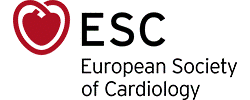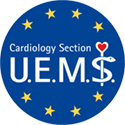ESC
UEMS Cardiology Section (cs) has a very Close Relationship and Strategic Partnership with the European Society of Cardiology (ESC). The main tasks of UEMS cs related to CME, CPD, and Professionalism while ESC is related to Science and Health Policy.
The main join activities are:
- Specialist Accreditation Committee in Cardiology (SACC)
- European Examination in Core Cardiology (EECC)
- Participation of Prof. Michalis as a member of the Educational Committee of the ESC
- The European Training Requirement (ETR) Document is one of the ESC Core Curriculum chapters
- Joint projects
Related Documents:
ESC Core Curriculum for the Cardiologist (2020)
ESC - Core Curriculum for the General Cardiologist (2013)
ESC - Core Curriculum for the General Cardiologist (2004-2006)
Core Curriculum for the General Cardiologist (2006-2008)
ESC - Core Syllabus (2004)
ESC UEMS-CS Cooperation (14. Oktober 2013)
Co-operation between ESC and UEMS-CS signed in October 2013
ESC and UEMS-CS have agreed to mutual recognition and express the intention of signing a letter of mutual understanding and recognition.

EACCME
The European Accreditation Council for Continuing Medical Education
In January 2000 the UEMS established the European Accreditation Council for Continuing Medical Education (EACCME®) with the aim of encouraging the highest standards in the development, delivery and harmonisation of continuing medical education (CME) and, later, of continuing professional development (CPD).
The purpose of the EACCME® was to provide accreditation of international CME in Europe and to facilitate the recognition of credits between the various countries in Europe. In order to reach this goal, the UEMS-EACCME® signed agreements of cooperation with countries in Europe, and also outside of Europe.
In order to support this recognition process, the UEMS-EACCME® introduced a common “CME currency”: the European CME Credit (ECMEC®).
In 2009, the EACCME® implemented criteria for the accreditation of e-learning materials.
In 2016, the EACCME® implemented EACCME® 2.0 including new forms of CME/CPD activities.
In 2017, the EACCME® launched its new platform for the accreditation of live educational events and e-learning materials and for the recognition of CPD/CME activities.
In 2017, EACCME in collaboration with the UEMS Section of Cardiology and the European Society of Cardiology (ESC) has set up a Specialist Accreditation Committee in Cardiology (SACC) for the evaluation and accreditation of live educational events and e-learning materials. This Committee is made up of reviewers coming from both the UEMS Section and the ESC.
The procedure of accreditation is as follows:
Applications in the field of Cardiology will be submitted to EACCME® through the EACCME® portal. The EACCME® criteria for live and e-learning events will apply for the submission, review, and accreditation process and the EACCME® Office will be responsible for managing the process of submission, review, and accreditation.
Note:
Both the EACCME® and the ECMEC® are registered trademarks of the UEMS and cannot be used without the prior authorization of the UEMS.

EJDA
Collaboration between the EJD and the UEMS has existed for several years in the form of formal and informal agreements that have benefited both institutions and, above all, the quality of medical training of European junior doctors. The EJD send Representatives to the UEMS Boards, Sections and Multidisciplinary Joint Committees (MJC) as the input of doctors in training in the matters of postgraduate medical training is considered of paramount importance for both institutions. They EJD representative shall also be invited to be part of the PGT visiting committees of their Boards, Sections, and MJC.
Representative, Feras El-Hamid Germany (until 31.10.2021)
http://www.juniordoctors.eu

AEPC
The AEPC was founded in Lyon in 1963 as Association Européenne pour la Cardiologie Pédiatrique. Since then, AEPC has become a network of specialists who are committed to the practice and advancement of Congenital Cardiology and closely related fields. Cardiology in the Young is the official journal of the AEPC. AEPC offers a free subscription of ‘Cardiology in the Young’ (CitY) as part of the annual membership fee. The membership offers also several other benefits.
The overall membership of the Association now stands at 1060 paediatric cardiologists and other specialists working in the field of paediatric cardiology and its related disciplines in 2010. The amount of members increases by 11% a year. As far as we are aware, this makes the Association the largest democratically administered global association in the field of congenital cardiology, and what is equally encouraging is that we now represent members from all the continents. New members are very welcome as they will always bring with them new ideas and innovations.
AEPC and its Working Groups aim to enhance collaboration amongst members for scientific research and professional development and to maintain high standards of professional practice. The Ordinary Members of AEPC originate from 32 countries in Europe, and each country is represented within the Association by an elected National Delegate. AEPC has also several members outside Europe. The Association co-operates with numerous associations working in the field of congenital heart defects originating from other continents. AEPC works also closely together with ESC and its organizations.

